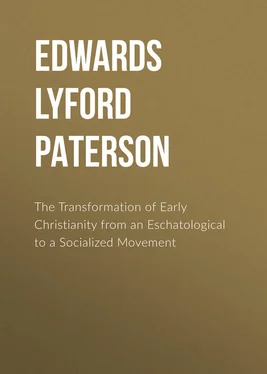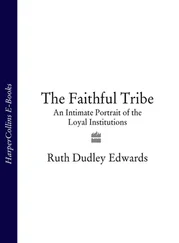Lyford Edwards - The Transformation of Early Christianity from an Eschatological to a Socialized Movement
Здесь есть возможность читать онлайн «Lyford Edwards - The Transformation of Early Christianity from an Eschatological to a Socialized Movement» — ознакомительный отрывок электронной книги совершенно бесплатно, а после прочтения отрывка купить полную версию. В некоторых случаях можно слушать аудио, скачать через торрент в формате fb2 и присутствует краткое содержание. Жанр: foreign_religion, foreign_antique, foreign_prose, на английском языке. Описание произведения, (предисловие) а так же отзывы посетителей доступны на портале библиотеки ЛибКат.
- Название:The Transformation of Early Christianity from an Eschatological to a Socialized Movement
- Автор:
- Жанр:
- Год:неизвестен
- ISBN:нет данных
- Рейтинг книги:4 / 5. Голосов: 1
-
Избранное:Добавить в избранное
- Отзывы:
-
Ваша оценка:
- 80
- 1
- 2
- 3
- 4
- 5
The Transformation of Early Christianity from an Eschatological to a Socialized Movement: краткое содержание, описание и аннотация
Предлагаем к чтению аннотацию, описание, краткое содержание или предисловие (зависит от того, что написал сам автор книги «The Transformation of Early Christianity from an Eschatological to a Socialized Movement»). Если вы не нашли необходимую информацию о книге — напишите в комментариях, мы постараемся отыскать её.
The Transformation of Early Christianity from an Eschatological to a Socialized Movement — читать онлайн ознакомительный отрывок
Ниже представлен текст книги, разбитый по страницам. Система сохранения места последней прочитанной страницы, позволяет с удобством читать онлайн бесплатно книгу «The Transformation of Early Christianity from an Eschatological to a Socialized Movement», без необходимости каждый раз заново искать на чём Вы остановились. Поставьте закладку, и сможете в любой момент перейти на страницу, на которой закончили чтение.
Интервал:
Закладка:
Apollinaris of Laodicea (300? -390 A.D.) is a notable figure in Christological controversy but unfortunately very little that he wrote has come down to us, and of that little the authenticity is not entirely unimpeachable. We are constrained to get his Chiliastic views from the writings of his theological opponents and unfortunately there is not wanting evidence to the effect that these opponents, Basil the Great and Gregory Nazianzen, notable Christians as they were, were not lacking in bias. Gregory 17 17 Ep. CII, 4.
calls the Chiliastic doctrine of the Apolinarians 'gross and carnal,' a 'second Judaism' and speaks of 'their silly thousand years delight in paradise.' Basil 18 18 Ep. CCLXIII, 4.
calls the Chiliasm of Apolinaris 'mythical or rather Jewish,' 'ridiculous,' and 'contrary to the doctrines of the Gospel.' This is, so far as the writer is aware, the first instance in which any great theologian goes to such extremes and Basil's language, though strong, is not altogether without an element of hesitation and questioning. In short it would seem that he asserted more than he felt sure of being able to prove – no rare phenomenon unfortunately in certain of the great contraversialists. If Basil's statements are to be taken at their face value Apollinaris was indeed the most Judaizing Christian in his Chiliasm of any of whom we have record. He would seem to justify Basil's jibe 'we are to be altogether turned from Christians into Jews,' for in his Messianic kingdom not only is the Temple at Jerusalem to be restored but also the worship of the old Law, with high priest, sacrifices, the ashes of a heifer, the jealousy offering, shew bread, burning lamps, circumcision and other such things which Basil indignantly denounces as 'figments,' 'mere old wives' fables' and 'doctrines of Jews.' 19 19 Cp. CCLXV, 2.
Although Apollinarianism was condemned by a council at Alexandria as early as 362 A.D. and Roman councils followed suit in 377 and 378 and the second Ecumenical Council in 381 and though Imperial degrees were issued against it in 388, 397 and 428 it persisted for many generations. The last condemnation on record is that of the Quinisextum Synod 691 A.D.
In this case, as in others mentioned, we see the unfortunate fate of Chiliasm in getting mixed up with heresies with which it, as such, had nothing to do. The extraordinary detestation which overtook Apollinaris as arch-heretic par excellence seems to have finally discouraged Chiliasm in the Eastern Church. It was reckoned as a heresy thereafter and though it appears sporadically down to our own day it is of no more interest for our purpose.
In the Western Church Chiliasm prevailed until the time of Augustine. It seems to have provoked very little discussion or controversy. Hippolytus, 235 A.D., carries on the Chiliastic tradition of Irenaeus but with a certain degree of assured futurity about the Second Advent not found in the earlier writers. This pushing of the Second Advent into the future is a marked feature of Western Chiliasm. By a weird use of 'types' Hippolytus proves with entire conclusiveness to himself that the Second Advent is to occur in the year 500 A.D. 20 20 Frag. Dan. I, 5, 6.
The overthrow of Rome has a prominent part in his elaborate description of the last times but he veils his statements with a certain amount of transparent discretion. 21 21 De Christo et Antic. 50.
He has in all other essential respects the same ideas as Irenaeus but expressed in a less naïve form. He is a transition figure. His Second Advent is far enough off to allow some considerable latitude for the building up of the ecclesiastical hierarchy which was the business of Rome and he emphasizes the point that the "gospel must first be preached to all nations." John the Baptist reappears as the precursor of Christ.
Commodianus, a North African bishop, 240 A.D., represents the generation after Hippolytus. His two poems present rather different versions of Chiliasm. The first is a simple and rather pleasing version. 22 22 Instructions, LXXX.
The only notable variation it contains is that the risen saints in the Millennial Kingdom are to be served by the nobles of the conquered anti-Christ. The second poem is an apologetic against Jews and Gentiles. "The author expects the end of the world will come with the seventh persecution. The Goths will conquer Rome and redeem the Christians; but then Nero will appear again as the heathen anti-Christ, reconquer Rome and rage against the Christians three years and a half. He will in turn be conquered by the Jewish and real anti-Christ from the East, who, after the defeat of Nero and the burning of Rome, will return to Judea, perform false miracles and be worshipped by the Jews. At last Christ appears with the lost tribes, as his army, who had lived beyond Persia in happy simplicity and virtue. Under astounding phenomena of nature he will conquer anti-Christ and his host, convert all nations and take possession of the holy city of Jerusalem." 23 23 Schaff Hist., ii, 855. Sec. LXVII of poem.
This double anti-Christ is perhaps the most notable variation. This idea reappears later, as does the Nero return which would seem to have been current belief.
There are perhaps only two other writers before Augustine that are worthy of mention, Victorinus and Lactantius. Victorinus, bishop of Poetovio, i.e., Petair in Austria, martyred 304 A.D., is the earliest exegete of the Latin Church. His 'Commentary on the Apocalypse' has come down to us in bad shape. The Chiliasm is of a type which may be described as formal and ritualistic in the sense that it is expressed in a matter of fact way as something not needing explanation, much less proof. There are only two new ideas: "The first resurrection is now of the souls that are by the faith, which does not permit men to pass over to the second death" 24 24 Comm. XX 4.5.
and "Those years wherein Satan is bound are in the first advent of Christ even to the end of the age; and they are called a thousand according to that mode of speaking wherein a part is signified by the whole – although they are not a thousand." 25 25 Comm. XX 1.3.
Lactantius the preceptor of Crispus, son of Constantine, brings us to the Chiliasm of the established Church. The end of the present age and the coming of the millennial kingdom are at the latest 200 years in the future, probably nearer, but the event instead of being looked toward to, is dreaded. The forthcoming destruction of Rome is bewailed. The world is safe as long as Rome stands. Nero is to be anti-Christ. "They who shall be alive in their bodies shall not die, but during those thousand years shall produce an infinite multitude, and their offspring shall be holy and beloved of God; but they who shall be raised from the dead shall preside over the living as judges. The nations shall not be entirely extinguished, but some shall be left as a victory for God, that they may be the occasion of triumph to the righteous and may be subjected to perpetual slavery." 26 26 Div. Ins. Bk. 7 XXIV.
The Chiliasm of Lactantius is proved from the Sibylline Oracles and from the philosopher Chrysippus, a Stoic. For the rest Lactantius repeats the traditional Christian and pre-Christian Jewish Chiliastic concepts with very little variation, but it is evident that the fact that the fall of Rome is dreaded will work out a change. The Chiliasm of Lactantius is unstable, not that there is the slightest breath of doubt about it, but that the attitude of mind which looked forward with dread to the Second Advent could be depended upon to find a theory for postponing it. Chiliasm is ready for its transformation.
In the century between Lactantius and Augustine there is no Chiliast of note in the west. It is abundantly evident however, from the works of Augustine that Chiliasm was common during that period as well as in the time of Augustine. Indeed Augustine himself was a Chiliast though probably not an exceedingly literal one, during his early period in the Church. 27 27 C.D. XX 7.
It is certain that he never regarded the doctrine as heretical. Even in the very book in which he puts forth the doctrine which eventually superseded Chiliasm he says: "This opinion would not be objectionable if it were believed that the joys of the saints in that Sabbath [27] C.D. XX 7.
shall be spiritual and consequent on the presence of God." 28 28 I.e., the Millennium.
We have in this quotation a hint as to the reason why he abandoned Chiliasm. He elaborates this in the immediately following passage: "As they say that those who then rise again shall enjoy the leisure of immoderate carnal banquets, furnished with an amount of meat and drink such as not only to shock the feeling of the temperate, but even to surpass the measure of credulity itself, such assertions can be believed only by the carnal." 29 29 C.D. XX 7.
Интервал:
Закладка:
Похожие книги на «The Transformation of Early Christianity from an Eschatological to a Socialized Movement»
Представляем Вашему вниманию похожие книги на «The Transformation of Early Christianity from an Eschatological to a Socialized Movement» списком для выбора. Мы отобрали схожую по названию и смыслу литературу в надежде предоставить читателям больше вариантов отыскать новые, интересные, ещё непрочитанные произведения.
Обсуждение, отзывы о книге «The Transformation of Early Christianity from an Eschatological to a Socialized Movement» и просто собственные мнения читателей. Оставьте ваши комментарии, напишите, что Вы думаете о произведении, его смысле или главных героях. Укажите что конкретно понравилось, а что нет, и почему Вы так считаете.












